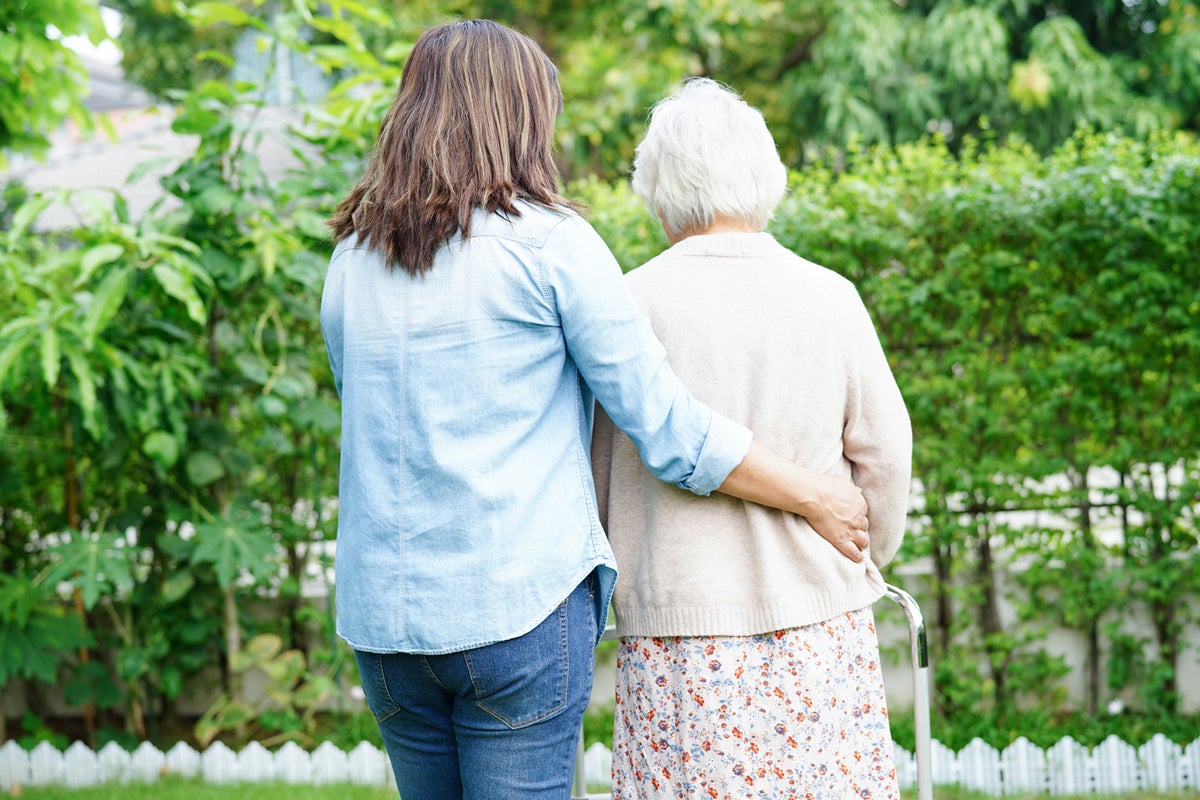
Support truly
independent journalism
An extra 400,000 people will be caring for their elderly, sick or disabled relatives for more than 10 hours a week by 2035, new analysis which lays bare the scale of social care needs in the UK suggests.
As the UK population gets older and lives with illness longer, many more people will have to step in to provide the care that health and social care services can’t. New research from think tank Joseph Rowntree Foundation projects that 990,000 more people will be providing some type of informal care by 2035 – an increase of 10.6 per cent compared to now.
The anti-poverty charity is calling for the government to create a future care needs taskforce, which would look at ways to support the booming number of informal carers.
The report found that paid care services would be insufficient to meet the growing need for support. Since 2016, the Joseph Rowntree Foundation found that only a fifth of over-65s in the UK who needed care used paid-for services alone. The rest used just informal unpaid care or a combination of both.
Researchers projected that 10 years from now, there will be 4 million people providing 10 hours or more of care, and 10.3 million carers in total.
One carer, Ruth Holden, 45, who lives near Manchester, looks after her husband Paul and her two teenage children.
She told The Independent how she tries to get by during the summer holidays when her children no longer get weekly food vouchers from college.
She said: “I’m mainly a full-time carer for my husband because he can’t be left for a huge amount of time. He used to work as a cleaner but one day, he fell down some stairs. We thought he had just hurt his back but he had actually damaged his spine.
“He carried on working and then it caused numbness in his leg. He can’t walk any more and uses an electric wheelchair.”
She continued: “It is difficult that he can’t get out and about as much. Because he lacks mobility, it has caused leg ulcers and thrombosis, which makes him isolated and it can be difficult.”
Ms Holden volunteers at the local food bank when she can because she too has needed their help. “I try and help people out because I’ve been there and done it. My kids go to the youth club at the church and they told the minister there that I needed to use the food bank because I wasn’t brave enough to tell them myself.
“I’ve had to use it a few times, but since I’ve had PIP I’ve managed to keep myself out. But you still have days where you’re just holding on until the money comes through,” she explained. Personal independence payment (PIP) is the new name for disability living allowance.
Charity Christians Against Poverty helped her get signed up for PIP after she was diagnosed with fibromyalgia.
When asked what politicians could do to help carers, Ms Holden said: “It would be nice to be supported to have a bit of independence and go back to work. It’s down to whether you can get care and I can’t afford to pay for care services.
“I wish they had a reality check that these benefits are needed and probably need to be a bit higher. What they think is a budget for people is not a sensible budget.”
Last weekend, work and pensions secretary Liz Kendall vowed that Labour would ditch the “divisive rhetoric” and blame culture towards people on benefits.
She said that an overhaul of the benefits system is needed. “We’ve never seen more people written off. The last parliament was the worst for economic inactivity on record. It is for us to put this right. But we will need big reforms and big changes. I know people worry about this but I want to say, we are on your side,” she said.
Abby Jitendra, policy adviser at the Joseph Rowntree Foundation, said: “In the next 10 years, the UK faces a crisis of care as we get older and live with illness for longer. Our already strained paid care system is unfit to meet growing and changing care needs.
“On top of that, a million more of us will be caring despite inadequate support which leaves unpaid carers at a higher risk of poverty. Government should set up a future care needs taskforce to plan cross-governmental action to meet the rising tide of care needs.”
A Department of Health and Social Care spokesperson said: “It is clear the adult social care system is broken, and we are determined to tackle this head-on.
“We will engage widely with a range of stakeholders, including people with lived experience, to inform our plans to create a sustainable National Care Service and are committed to ensuring a professional, well supported social care workforce is able to provide personalised and accessible care to all those who draw on it as demand increases.”







